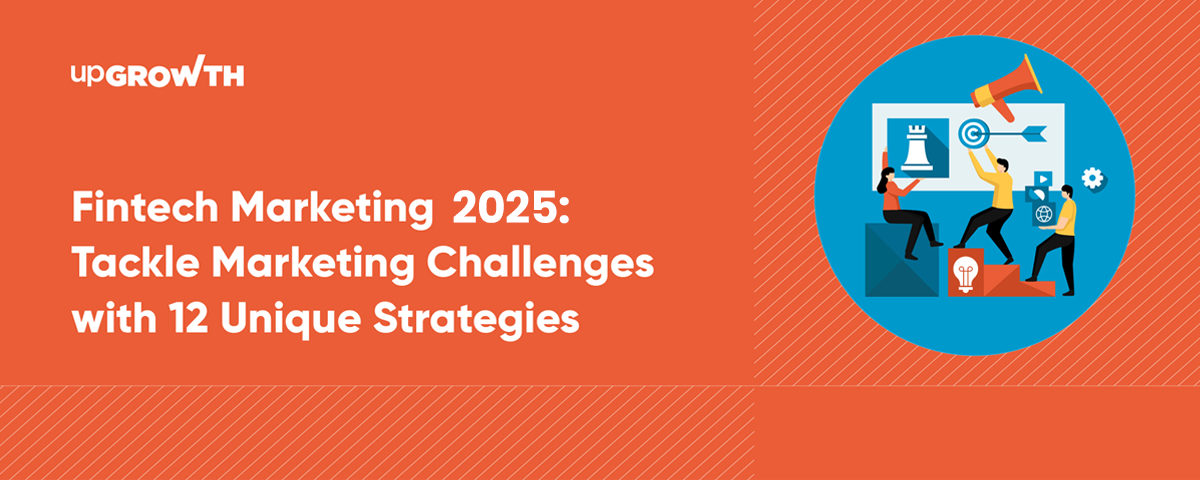Fintech Marketing 2025: Tackle Marketing Challenges with 12 Unique Strategies
Contributors:
Amol Ghemud
Published: March 8, 2024

The financial technology landscape, or “fintech” for short, is experiencing an explosive growth spurt. From mobile payments and robo-advisors to blockchain-powered solutions and alternative lending platforms, fintech is revolutionising how we manage our money. But with this rapid evolution comes a crucial question: how can fintech companies effectively reach their target audience in a crowded and ever-evolving marketplace?
This is where fintech marketing comes in. It’s the art and science of crafting and executing strategies to attract, engage, and convert potential customers in the dynamic world of finance and technology. However, navigating the intricacies of fintech marketing strategies presents a unique set of challenges for both established players and aspiring startups.
Challenges in Fintech Marketing
Fintech companies invest heavily in customer acquisition, often spending millions on marketing. A report reveals that Indian fintech startups alone spent a significant amount, $23.9 million, on advertising and promotions in fiscal year 2022. However, many rely on tactics like discounts and cashback to attract customers, who readily switch to competitors offering better deals. This highlights a challenge: customers acquired through non-organic means, like heavy promotions, tend to churn quickly, as per an AppsFlyer report. For instance, 47.05% of users uninstall their apps if they were through non-organic means.
One more thing, While investments in fintech companies have fluctuated significantly, with a peak of USD 247 billion in 2021 and a decline to USD 52.4 billion in 2023, it doesn’t mean you should hit the brakes on marketing efforts.
Instead, this trend highlights the need to adapt your fintech marketing strategy. By focusing on wise spending and staying aligned with current market trends, you can ensure your brand continues to thrive.
Fintech marketing challenges often stem from the very nature of the industry. Let’s delve into some of the most prominent hurdles faced by fintech companies:
- Building trust in a nascent industry: Fintech solutions often disrupt traditional financial institutions, leading to scepticism and hesitancy among potential users. Fintech marketing strategies need to emphasise transparency, security, and user education to build trust and establish credibility.
- Cutting through the noise in a crowded market: The fintech space is teeming with innovative startups and established players vying for attention. Developing a marketing strategy for fintech startups requires a keen understanding of your target audience, a unique brand voice, and creative ways to stand out from the crowd.
- Navigating complex regulations: The financial sector is heavily regulated, and fintech companies must adhere to strict compliance requirements. This can add a layer of complexity to fintech go-to-market strategies, requiring careful planning and adherence to regulatory frameworks.
- Educating and engaging a tech-savvy audience: Fintech users are typically tech-savvy and have high expectations for digital experiences. Fintech marketing strategies need to be informative, engaging, and cater to this digitally-inclined demographic.
These challenges, while formidable, can be overcome with a well-defined fintech marketing strategy that leverages the unique opportunities presented by the digital landscape. Stay tuned for the next part, where we’ll explore 12 unique and effective fintech marketing strategies to help you navigate these challenges and thrive in the exciting world of financial technology.
Fintech Marketing Strategies for 2025
As we enter 2025, the fintech landscape continues to evolve rapidly, influenced by technological advancements, shifting customer expectations, and regulatory changes. Here are 12 cutting-edge marketing strategies tailored for 2025 to help fintech companies stay ahead:
1. Educate Through AI-Powered Tools
Replace traditional educational content with AI-driven tools like chatbots and interactive financial advisors. These tools can provide real-time answers to financial queries and guide users through investment decisions tailored to their unique profiles. For example, an AI chatbot could help explain ESG investing or cryptocurrency nuances in seconds.
2. Web3 Integration and Marketing
Adopt a Web3-first approach to cater to the increasing interest in blockchain and decentralized finance. Build campaigns highlighting your fintech’s adoption of blockchain for security or DeFi integrations. Showcase features like tokenized rewards, NFT-based loyalty programs, or partnerships with decentralized platforms.
3. Content-Driven Community Platforms
Move beyond standard content formats to create community-driven platforms where users can interact, learn, and share insights. A dedicated portal with financial tools, peer-to-peer forums, and gamified learning experiences can foster engagement and build brand loyalty.
4. SEO with Generative AI
SEO strategies in 2025 will be powered by generative AI, which will enable predictive keyword targeting and content optimization at scale. Focus on conversational AI-driven search trends, voice search optimization, and AI chat queries on platforms like ChatGPT and Google Bard, which are becoming standard.
5. Humanizing Your Brand Through Sustainability
Sustainability is a key differentiator in 2025. Develop marketing campaigns around green finance initiatives such as carbon offset programs or sustainable investment options. Highlight your fintech’s contribution to ESG goals to resonate with environmentally conscious users.
6. Micro-communities and Decentralized Influencers
Collaborate with micro-communities and influencers in niche spaces such as crypto, sustainable investing, or millennial freelancers. Instead of traditional influencers, consider working with decentralized influencers—individuals with blockchain-verified authenticity—who appeal to specific Web3-savvy audiences.
7. Focus on Financial Wellness
Position your fintech as a partner in financial wellness rather than just a provider of tools. Use behavior analysis to offer personalized financial health scores, actionable insights, and tips. Market these features as life-enhancing solutions rather than transactional services.
8. Real-Time Personalization with AI
2025 demands real-time personalization. AI now enables marketing campaigns to adapt dynamically based on a user’s current behavior—whether they’re browsing your website, engaging with your app, or scrolling through social media. This ensures that hyper-relevant messages reach users at the right time.
9. Blockchain for Trust and Transparency
Use blockchain technology to demonstrate transparency. For example, offer real-time transaction tracking or immutable records of financial data. Highlight how blockchain ensures data security and positions your fintech as a leader in customer safety and innovation.
10. Interactive and Immersive Content
Engage users with immersive experiences like virtual reality (VR) investment simulators or augmented reality (AR) loan calculators. These tools not only make financial education fun but also enhance understanding, leading to better decision-making and trust in your brand.
11. Collaborate on RegTech Messaging
Regulations are tightening in fintech, and customers need reassurance. Partner with RegTech providers to showcase your fintech’s compliance capabilities. Use marketing campaigns to highlight features like automated compliance checks and fraud prevention tools.
12. Future-Proof Your Offerings with AI and Quantum Tech
Show customers you’re ready for the future by incorporating and marketing your use of quantum computing for risk modeling or advanced AI algorithms for fraud detection. These forward-looking technologies signal innovation and security, appealing to tech-savvy customers.
Examples of Good Fintech Marketing Strategies
1. Fi.Money: From Zero to Feature Snippet Hero in 6 Months!
Fi.Money, the cool app that makes banking a breeze, needed a traffic boost to match their awesome financial products. They were stuck in the “branded keywords only” zone, which isn’t exactly a recipe for organic growth success.
Enter upGrowth, the SEO superheroes! We swooped in, analysed the competition, and discovered the powerful potential of featured snippets. These are those handy little answer boxes that pop up at the top of Google searches, and we knew they could be Fi.Money’s ticket to fame (and more website visitors).
Here’s the secret sauce:
- We decoded the snippet code: We cracked the Google Search Engine code, figuring out the ideal word count, structure, and even bolding magic for each snippet type (lists, paragraphs, you name it!).
- Content with a twist: We transformed Fi.Money’s content into snippet-winning masterpieces, adding lists, tables, and even videos where they fit.
- Experimentation is key: We didn’t just throw things at the wall and hope for the best. We constantly tested and tweaked our approach, seeing immediate results that kept getting better.
The outcome? Fi.Money went from zero featured snippets to a whopping 15,000+ in just 6 months! That’s a traffic explosion fueled by the power of SEO and a dash of upGrowth magic.
So, if your website is stuck in a traffic rut, don’t despair! UpGrowth can be your SEO sidekick and help you rise to the top of the search results (and maybe even snag a featured snippet or two along the way).
2. Nivesh
Nivesh, a fintech platform helping mutual fund distributors. They were like a tumbleweed in the vast desert of organic traffic, barely getting any visitors. But then upGrowth, the SEO experts, came with a plan!
The Challenge: Nivesh wanted more quality leads and traffic to their product pages, especially for mutual fund distributors. They were ready to take some risks to achieve this.
The Solution: upGrowth, the SEO wizards, took Nivesh’s website from disorganized to SEO-friendly. They built a new website with clear information architecture, crafted engaging content, and implemented advanced SEO strategies. They even experimented with cool stuff like instant indexing and internal linking structures.
The Result: Boom! Nivesh’s website traffic skyrocketed by a whopping 700% in just 6 months! That’s right, from tumbleweed to an organic oasis!
The Takeaway: This case study proves that SEO can be a powerful tool for any business, even in the competitive world of fintech. With the right strategy and a dash of experimentation, you too can watch your website traffic flourish!
Conclusion
By implementing these 12 unique fintech marketing strategies, you can navigate the dynamic world of fintech and achieve success. Remember, the key lies in understanding your target audience, providing value, and building trust. Embrace a data-driven approach, experiment strategically, and continuously adapt to stay ahead of the curve. With the right strategies in place, you can turn your fintech venture from a fledgling startup into a thriving success story.
In conclusion, the future of fintech is bright, and the opportunities for innovative marketing are limitless. Embrace these strategies, stay ahead of the curve, and watch your fintech brand soar!
FAQs
1. How can fintech companies leverage AI in their marketing strategies?
Fintech companies can leverage AI for:
- Personalization: AI can analyze customer data to personalize marketing messages and offers, leading to increased engagement and conversions.
- Chatbots: AI-powered chatbots can provide 24/7 customer support and answer basic queries, improving user experience.
- Content creation: AI can be used to generate personalized content like blog posts or financial recommendations.
- Fraud detection: AI can identify and prevent fraudulent transactions, enhancing security and trust.
2. What role does blockchain technology play in fintech marketing?
Blockchain technology can be used for:
- Transparency: Companies can leverage blockchain to showcase the security and transparency of their financial transactions in marketing materials.
- Targeted advertising: Blockchain can enable targeted advertising based on user behavior on decentralized finance (DeFi) platforms.
- Building trust: Highlighting the use of blockchain can build trust with security-conscious customers.
3. Are there specific regulations fintech marketers need to be aware of?
Absolutely! Fintech regulations vary by region and type of service. Marketers must be aware of relevant regulations governing data privacy, advertising, and consumer protection. Failing to comply can lead to legal repercussions and damage brand reputation.
4. How can fintech brands effectively target and engage Gen Z and millennial audiences?
To engage Gen Z and millennials, fintech brands need to:
- Utilize social media: Be active on platforms like TikTok and Instagram with engaging content and influencer partnerships.
- Focus on user experience: Offer mobile-first experiences with intuitive interfaces and gamification elements.
- Promote financial literacy: Create educational content that resonates with their financial goals and anxieties.
- Embrace social responsibility: Highlight your commitment to environmental, social, and governance (ESG) issues that resonate with these generations.
5. What are some creative ways fintech companies can use social media for marketing?
- Run interactive polls and quizzes to spark user engagement.
- Host live Q&A sessions with financial experts.
- Partner with social media influencers for product endorsements and reviews.
- Utilize social media advertising to target specific demographics and interests.
- Create educational and informative video content on financial topics.
6. How does personalization enhance fintech marketing efforts?
Personalization allows for:
- More relevant marketing messages: Tailor your communication to individual needs and preferences, leading to higher engagement and conversion rates.
- Improved customer experience: By understanding user behavior, you can offer relevant products and services, enhancing satisfaction.
- Stronger brand loyalty: Personalized interactions foster deeper connections with customers, building brand loyalty.
Read More:
Power of SEO in Fintech App Development: A Guide to Boosting Visibility
Fintech Content Marketing: Creating SEO-Friendly Financial Content
SEO Analytics for Fintech: Measuring Success and ROI
Voice Search SEO for Fintech: Adapting to Changing Search Trends
International SEO for Fintech: Expanding Globally with SEO
Fintech SEO Trends to Watch in 2024 – How Fintech Startups Can Leverage SEO for Growth
About the Author
Optimizer in Chief
Amol has helped catalyse business growth with his strategic & data-driven methodologies. With a decade of experience in the field of marketing, he has donned multiple hats, from channel optimization, data analytics and creative brand positioning to growth engineering and sales.
 Growth Strategy and Planning
Growth Strategy and Planning Inbound Growth
Inbound Growth Growth Hacking
Growth Hacking Search Engine Optimization
Search Engine Optimization Paid and Performance Marketing
Paid and Performance Marketing Social Media Marketing
Social Media Marketing AI-Driven Growth Strategy
AI-Driven Growth Strategy
 Growth Tools
Growth Tools Offers
Offers


















Leave a Reply